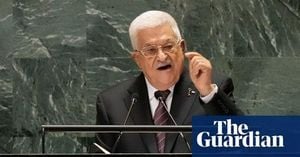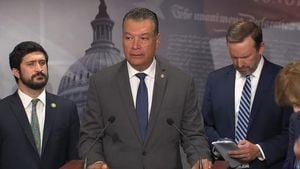On August 15, 2025, the health policy community in Washington was abuzz after a draft of the much-anticipated "Make America Healthy Again" (MAHA) report, spearheaded by U.S. Health and Human Services Secretary Robert F. Kennedy Jr., was leaked to the press. The Associated Press obtained the document, which is said to outline the Trump administration’s strategy for tackling chronic disease and improving the health of Americans. Yet, as the dust settles, the report’s recommendations—and the political intrigue swirling around Kennedy—have stirred as many questions as answers.
The MAHA report, which Kennedy has championed as a signature achievement, focuses on four key culprits behind America’s chronic health woes: poor diet, chemical exposure, lack of physical activity, and the overuse of medications. According to the draft, the federal government should prioritize further studies into these areas, urging the National Institutes of Health (NIH) to conduct research on vaccine injury, autism, air quality, water quality, prescription drug use, and nutrition. The report also calls for changes to the foods served in schools and hospitals, a move that many public health advocates have long demanded.
But the recommendations stop short of the sweeping policy changes that some of Kennedy’s supporters had anticipated. As reported by The New York Times and confirmed by the Associated Press, the MAHA document does not propose new regulations on the agricultural or pharmaceutical industries. Instead, it suggests launching an "awareness" campaign to boost public confidence in pesticides—an approach that surprised both critics and supporters, given Kennedy’s long history of criticizing chemicals in the food supply.
For months, the agricultural sector had anxiously awaited the report, fearing calls for bans or tough investigations into the pesticides and herbicides they rely on. Farmers were also concerned about potential crackdowns on corn syrup, a staple sweetener in processed foods and a frequent target in Kennedy’s previous advocacy. Yet, as the report landed on President Donald Trump’s desk, those fears seemed to dissipate. Rather than adversarial language, the draft encourages bridge-building with farm interests.
Calley Means, a close adviser to Kennedy, emphasized this shift in tone. On August 12, Means urged MAHA supporters to work collaboratively with major farm companies, acknowledging that "the pace of political change can be frustrating." Means added, “We need to build bridges. We are not going to win if the soybean farmers and the corn growers are our enemy.” As of Friday, neither Means nor Kennedy’s team responded to further requests for comment.
Meanwhile, the White House has yet to officially release the MAHA report. Kush Desai, a spokesman for the administration, would not confirm whether the draft obtained by the Associated Press reflected the final version. “President Trump pledged to Make America Healthy Again, and the Administration is committed to delivering on that pledge with Gold Standard Science,” Desai said. “Until officially released by the White House and MAHA Commission, however, any documents purporting to be the second MAHA Report should be considered as nothing more than speculative literature.”
This uncertainty has left advocates and critics alike wondering how much weight the report will carry, especially given the funding constraints facing public health agencies. The Trump administration’s 2025 budget included a 40% cut to the NIH and eliminated $1 billion previously set aside to help food banks and schools purchase food directly from local farmers. Kari Hamerschlag, deputy director of food and agriculture at Friends of the Earth, told the Associated Press, “This is not going to transform our food and farming system. This is not going to make people healthier. They need to put resources behind their recommendations.”
Amid the policy debate, Secretary Kennedy has faced political crossfire of his own. On the same day the draft report made headlines, Kennedy moved to quash rumors that he was eyeing a presidential run in 2028. The speculation, fueled by far-right commentator Laura Loomer, had targeted Kennedy’s top aide, Stephanie Spear, questioning her loyalty to President Trump’s agenda. Kennedy responded forcefully, labeling the rumors a "flat-out lie."
In a statement posted on X (formerly Twitter), Kennedy accused Washington, D.C. lobbyists of trying to drive a wedge between him and Trump. “The swamp is in full panic mode,” Kennedy wrote. “DC lobby shops are laboring fiercely to drive a wedge between President Trump and me, hoping to thwart our team from dismantling the status quo and advancing @POTUS' Make America Healthy Again agenda. They're pushing the flat-out lie that I'm running for president in 2028. Let me be clear: I am not running for president in 2028.”
Kennedy went on to reaffirm his loyalty to Trump and the MAHA mission, stating, “My loyalty is to President Trump and the mission we've started. Their attacks on my staff, especially Stefanie Spear—a fierce, loyal warrior for MAHA who proudly serves in the Trump Administration and works every day to advance President Trump's vision for a healthier, stronger America—are proof we're over the target.”
He concluded with a note of defiance: “We'll keep moving forward, we'll keep delivering wins, and no smear campaign will stop us. President Trump is delivering on every promise beyond my wildest dreams—ending war, protecting free speech, rebuilding American industry and the American middle class, delivering transparency and gold standard science, and breaking the grip of entrenched interests.”
Supporters echoed Kennedy’s sentiments. Tony Lyons, head of the MAHA PAC, told The Hill, "The story that Secretary Kennedy was running for president was a made up story. There's no truth to it whatsoever." Kennedy himself added on X, “The president has made himself the answer to my 20-year prayer that God would put me in a position to end the chronic disease epidemic—and that's exactly what my team and I will do until the day he leaves office.”
With the 2028 presidential race still years away, the rumor mill is already churning. On the Republican side, President Trump has named Vice President JD Vance as the "most likely" heir apparent. A recent Emerson College poll found Vance leading among likely Republican contenders in North Carolina, with his support rising seven percentage points since June. Florida Governor Ron DeSantis and Secretary of State Marco Rubio trailed behind, at 7 percent and 5 percent, respectively.
For now, Kennedy’s focus remains on the MAHA agenda and the challenges ahead. The next steps for the report—and the administration’s broader health strategy—will likely depend on how the White House chooses to act on its recommendations and whether Congress restores any of the funding that public health advocates say is urgently needed. As the debate continues, both the health of the nation and the political fortunes of its key players hang in the balance.



